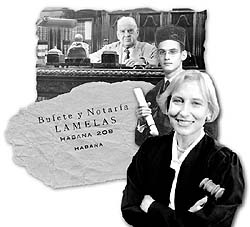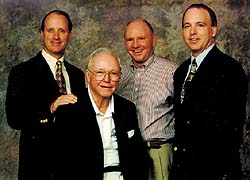|
![]()
Vol. 71, No. 8,
August 1998
Following in the Family Footsteps
Seeking Justice: The Lamelas Family

The events witnessed as a child in Cuba and the years
the Lamelas family lived in poverty after first arriving in the United States
influenced the career choices of Elsa de la Caridad Lamelas Salazar, now
known as the Hon. Elsa C. Lamelas of the Milwaukee County circuit court
(below right).
In a picture taken in the family's Havana law firm in
the 1950s, Francisco José Lamelas Collado is seated at a mahogany
table carved by a European craftsman who fled to Cuba during WWII.
"How ironic that a few years later he, too, would
have to flee and leave all behind," says Elsa of her grandfather. "Everything
was seized by the Castro government." A scrap of an old manila envelope
with the law firm name and address is all that remains of the family's firm.
Upon his graduation from the Universidad de la Habana
in 1941, Francisco José Lamelas Blanco (Elsa's father, shown in his
graduation picture) became the youngest member of the Havana Law Association
when he joined his sister and father in the family law practice. |
When Francisco José Lamelas joined his sister and father in the family
law practice in Cuba, he became the youngest member of the Havana Law Association.
He practiced law in his homeland for 20 years, actively seeking legal reforms,
and was busy with a full trial schedule. Then Fidel Castro came to power,
and "things started getting bad little by little," he recalls.
"Being a lawyer became very controversial."
It was time to get the family out of Cuba. Daughters Elsa and Blanche
left first in what were called "Peter Pan" airlifts transporting
children to U.S. orphanages. Next came his wife and young son.
"I was the last one, and I wasn't sure I would be allowed to leave,"
Francisco says. The day before he left, a justice at a Supreme Court hearing
attempted to provoke him into a confrontation that might have landed him
in prison. "I handled that very well, but nobody could be safe from
the government."
After they were reunited, the Lamelases settled in Chicago where Francisco
started law classes, but he discovered he could not finish law school in
the requisite five years while working full time to support his family.
Instead, he found a job as a law clerk and later taught Spanish language
and literature at Dominican College in Racine. His final career move was
to become a juvenile probation officer for 18 years with Milwaukee County.
"I am a lawyer by nature," Francisco acknowledges. He enjoyed
interacting with his juvenile clients and the legal system. And he is proud
that a third generation of the Lamelas family has taken up law.
Elsa Lamelas crisscrossed the country as an attorney for the Civil Rights
Division of the U.S. Department of Justice before settling down in Milwaukee,
where she worked with the Equal Employment Opportunities Commission, the
district attorney's office, and finally the U.S. attorney's office before
her appointment to the Milwaukee County circuit court bench.
As Elsa discusses her career choices, she recalls "the dramatic
events I witnessed in Cuba that I will never forget" and the years
her family lived in poverty after first arriving in the United States. "I
really thought the law was an instrument to change the world, and I very
much wanted to do that," she says simply.
Hometown and Beyond: The O'Melias

Gathered for a family portrait are O'Melia attorneys
(from left) John Jr., Richard, Michael, and Patrick. Brothers John Jr. and
Patrick practice in the family's Rhinelander firm, their uncle Richard practices
in Washington, D.C., while cousin Michael is a circuit judge in Phoenix,
Ariz. |
In Rhinelander in the first half of the century, no one was surprised when
the doctor's child became a doctor or the dentist's son took up dentistry,
recalls Richard O'Melia. The fact that three of Albert J. (A.J.) O'Melia's
sons took up the law was a bit more remarkable.
A.J. O'Melia opened his practice in 1911 after graduating with the first
class out of Marquette University Law School. Two sons, Donald and John,
joined him in the Rhinelander office, while Richard opened the Milwaukee
office of O'Melia and Kaye after completing law school following service
as a Marine fighter pilot in World War II.
Richard went to Washington with family friend Joe McCarthy after helping
with McCarthy's 1952 Senate campaign. "I said I'd go for one year,
and it's been 50," says Richard, who served as general counsel with
the U.S. Senate Operations Committee, which McCarthy chaired. He later worked
on staff with the Civil Aeronautics Board before being appointed to CAB
in 1974. More recently, he became one of the founders of U.S. African Airways.
Back home, the third generation of O'Melias entered the profession. In
1979 John Jr. joined his father and uncle in the family firm, now O'Melia,
Schiek and McEldowney. His brother, Patrick, also joined the practice for
several years before becoming Oneida County District Attorney in 1989.
Their uncle Donald's son, Michael, is a circuit judge in Phoenix, and
his daughter, Amy O'Melia-Endres, recently became a fourth generation O'Melia
lawyer after graduating from Arizona State University Law School. John Jr.
didn't decide to become a lawyer until his second year in college, though
he recalls attending his father's trials while in high school and once was
invited behind the scenes to watch as jury instructions were drawn up in
chambers. Once he decided on the law, "I always assumed I would come
back to Rhinelander and practice with my father and uncle."
Conclusion
As diverse as these lawyerly families may be, they share an abiding passion
for their work. "This is a wonderful profession that encourages pro
bono work," says Joe Tierney Jr. "It gives us the opportunity
to help people who need help, and we enjoy doing it."
That frame of reference is itself a strong legacy. Notes grandson Martin,
"Because of my father and grandfather, I had a great deal of respect
for the law and still do."
Tedia's mother, Sherry Ackerman, is a Spanish teacher,
and Tedia thinks it fitting that the public defender's office hired her
as much for her knowledge of Spanish as for her law degree. "I get
to use my mother's skill in my father's profession," she says.
Karen Bankston is a first generation writer/editor
based in Stoughton.
|
